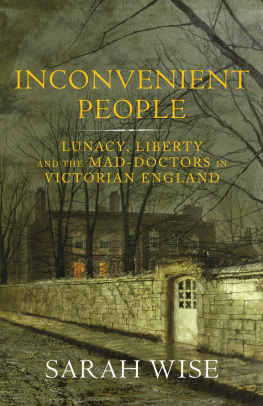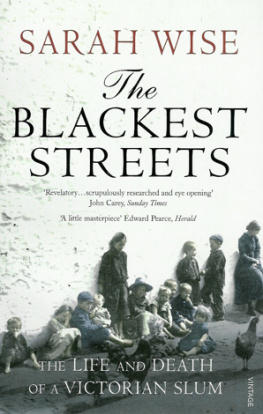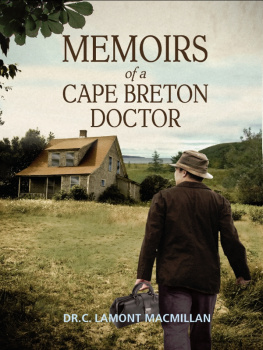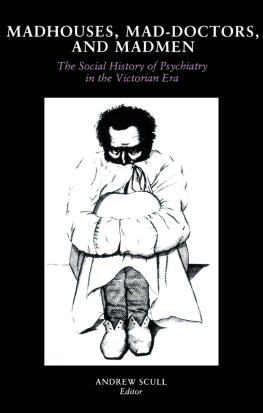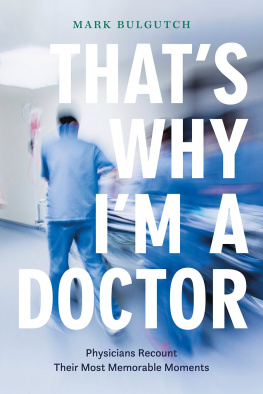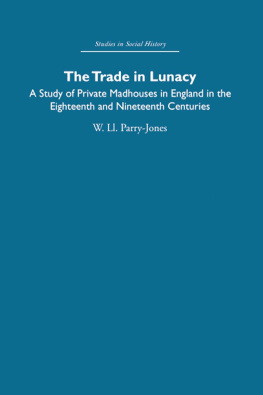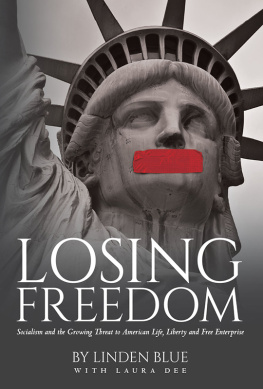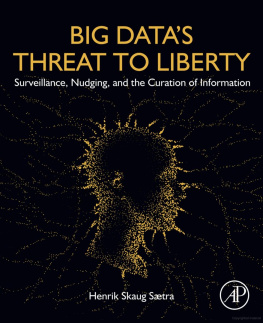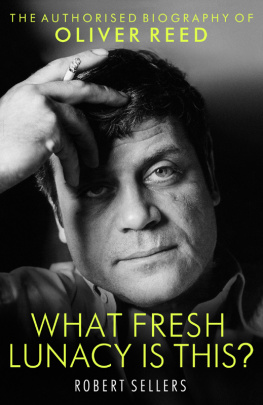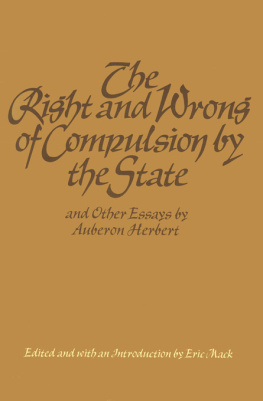Contents
Acknowledgements
I am extremely grateful to David Tuke, great-grandson of Dr Thomas Harrington Tuke (18261888), who told me the hearsay evidence of letters between his ancestor and Charles Dickens, regarding the novelists wife. Many thanks also to Pamela Bater for putting me in contact with Mr Tuke and for alerting me to this previously unrecognised aspect of Bozs life.
Anne Monroe, daughter of Georgina Weldons biographer Edward Grierson, has generously allowed me to quote from the material he gathered, and to reproduce images from his book, Storm Bird: The Strange Life of Georgina Weldon. I am grateful to Dr Helen Nicholson, of Manchester Metropolitan University, for helping me to make contact with Ms Monroe.
Stefan Dickers, archives supremo at the Bishopsgate Institute, has given his time freely in assisting with picture research, and I am indebted to him for many of the images that appear in this book, courtesy of the wonderful Bishopsgate Library, London.
Clare Fleck of Knebworth House Archives allowed me to work through the holdings at the Lyttons ancestral home. Rod and Celia Fitzhugh kindly offered me the use of their archive pictures of the Agapemone, reproduced in , was similarly generous in permitting me to use his archive illustrations from The Woman in White.
Maisie Brown of the Barnes & Mortlake History Society gave me the co-ordinates of the younger Dr Winslows last resting place, but I still couldnt penetrate the ivy.
History should consist of a mass of local histories, said someone I forget who. In this country, we have a multitude of small treasure houses to help us write these tales: Francesca Anyon, of Wirral Archives Service, tracked down the fate of Mary Jane and Charles Turner. Dr Jonathan Oates, of the Ealing Local History Centre, provided background on Lawn House in Hanwell. I would also like to thank: Tudor Allen and Lesley Marshall at Camden Local Studies and Archives Centre; Jane Baxter of Richmond upon Thames Local Studies; Carolynne Cotton of Uxbridge Local Studies and Archives; Valerie Crosby of Haringey Local History Library and Archives; Patricia Fallon, Cecilia Alvick and Alison Kenny at the City of Westminster Archives Centre; Carol Futers and all the staff at Hertfordshire Archives and Local Studies; Carolyn Hammond, Mary Blyth and Janet McNamara of Chiswick Local Studies Library; Isabel Hernandez and Tim Reid of the Local Studies Department at Kensington Central Library; Rhian James of Powys County Archives Office; Kate Jarvis of Wandsworth Heritage Service; Ruth McAuley of the Archives and Local History department at Explore York Library; Kai Michael of Gwent Record Office; Ann Nix of Somerset County Records Office, and Esther Hoyle at the Somerset Heritage Centre; Fiona M. Price of the Lambeth Archives; the staff of Staffordshire Archive Service and the William Salt Library; Janice Sullivan of Sevenoaks Local Studies; Liz Wigmore of the Bury Record Office.
By sad coincidence, of all the local archives that I have consulted the one that is most under threat is the Hammersmith and Fulham Local Studies Library my own nearest library when I was growing up in West London and where I used to go to get peace and quiet when revising for my A-levels. These days: slashed opening hours, volunteers replacing professional staff, a precarious future. Thanks to Wendy Hawke, LMA senior archivist, and all the rest of the team who battle on in Hammersmith in these less than propitious circumstances.
Thanks also to Dr Lesley A. Hall, Helen Wakely and the staff at the library of the Wellcome Collection; the staff at the British Library and the Newspaper Library in Colindale; the staff of the Westminster Reference Library; the V&A National Art Library, V&A Theatre & Performance Enquiry Service and V&A Prints Department; The National Archives; the London Metropolitan Archives; the British Museum Prints Room; Sally James of Benjamin Franklin House; Colin S. Gale of Bethlem Royal Hospital Archives; Lambeth Palace Library; Peter Hopkins of the Roderic Bowen Library and Archives at the University of Wales Trinity St David; Jacque Roethler of the Archives Department of the University of Iowa Libraries; Debra Longley, Tamsin Cook and Jonathan Butler of English Heritage; Dr Anne Mouron and the staff at the Bodleian Library; Betty Nixon of the Galton Institute; Professor Malcolm Andrews, editor, and Dr Tony Williams, associate editor, The Dickensian, and Elizabeth Velluet of The Dickens Fellowship; and Andrew Roberts for his wonderful Studymore online resource.
Thank you Will Sulkin, Jrg Hensgen, Katherine Ailes, Kay Peddle, Anna Cowling, Beth Humphries, Chloe Johnson-Hill and Ruth Waldram at the Bodley Head; and Kate Pool at the Society of Authors.
I have chewed the (Victorian) fat with Dr Michelle Johansen, Lee Jackson, Elizabeth Tames and David Clifford. Thanks especially to Peter, Debbie, Lucia, Caroline and Michael, Tina, Sindy, Diane, Sharon and Matt, Prue, Mandy and Rob, Leigh and Alex, Wanda and Roland, Katie, Lis, Clive, Eve, Sian, Lily, Pauline and Phil; and all the Neishes, big and little.
About the Book
Gaslight tales of rooftop escapes, men and women snatched in broad daylight, patients shut in coffins, a fanatical cult known as the Abode of Love...
The nineteenth century saw repeated panics about sane individuals being locked away in lunatic asylums. With the rise of the mad-doctor profession, English liberty seemed to be threatened by a new generation of medical men willing to incarcerate difficult family members in return for the high fees paid by an unscrupulous spouse or friend. And contrary to popular modern belief, the madwoman in the attic was at least as likely to have been a madman.
Among the victims were the beautiful and charismatic Rosina, wife of the novelist Edward Bulwer-Lytton; Edward Davies, victim of a mothers greed; Louisa Lowe, who paid for her religious fervour; and John Perceval, who, despite the best efforts of the abusive asylum attendants, cured himself.
Sarah Wise uncovers twelve shocking stories, untold for over a century, which reveal the darker side of the Victorian upper and middle classes their sexuality, fears of inherited madness, financial greed and fraudulence and chillingly evoke the black motives at the heart of the phenomenon of the inconvenient person.
About the Author
Sarah took an MA in Victorian Studies at Birkbeck College, University of London. Her most recent book, The Blackest Streets, was shortlisted for the Royal Society of Literatures Ondaatje Prize (2009). Her debut, The Italian Boy: Murder and Grave Robbery in 1830s London, was shortlisted for the 2005 Samuel Johnson Prize and won the Crime Writers Association Gold Dagger for Non-Fiction. Sarah was a major contributor to Iain Sinclairs compendium London, City of Disappearances. She has spoken on Radio 4s Thinking Allowed, Womans Hour and the Today programme, and she regularly lectures to societies and at history events. She lives in central London.
ALSO BY SARAH WISE
The Italian Boy
The Blackest Streets
Appendix 1
Lunacy legislation affecting wrongful confinement
Successive Acts of parliament included clauses addressing the prevention of the incarceration of the sane. The list below excludes minor amending Acts and legislation concerning other aspects of lunacy care.
1774 ACT FOR THE REGULATION OF PRIVATE MADHOUSES
This, the first legislation to regulate private lunacy care, laid down that madhouse keepers could accept a paying patient only upon the signed certificate of a medical man. No certificate was required if a patient was to be confined in his/her own home.
Every madhouse accommodating more than one lunatic required a licence. Five Lunacy Commissioners, elected by the College of Physicians, granted the licences within a seven-mile radius of London and inspected premises. Beyond, licensing and inspection were undertaken by local magistrates.
Next page
